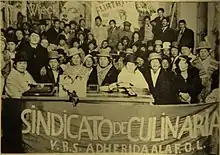Petronila Infantes
Petronila Infantes (La Paz, 29 June 1911 - La Paz, 8 October 1991) was an anarchist and trade unionist from Bolivia. She was the founder of the Culinary Workers Union. She was a leader of the women's anarchist movement in Bolivia.
Petronila Infantes | |
|---|---|
.jpg.webp) | |
| Born | 29 July 1911 La Paz |
| Died | 10 May 1991 La Paz |
| Other names | Dona Peta |
| Citizenship | Bolivia |
| Occupation | Cook; Trade Unionist |
| Movement | Culinary Workers Union; Women Workers Federation |
Biography
Infantes was born in La Paz on 29 June 1911.[1] At a very young age she went to live in Eucaliptus.[2] She worked with her father for an American company there, but he died when she was very young.[2] Soon after she started working as a street vendor,[3] then later as a cook, trained by her mother.[4][5] During her first marriage she had a son, José Enrique, and a daughter, Alicia.[1] Her wedding was a civil, rather than a religious ceremony, as she was suspicious of where and how the church's wealth was distributed.[6]
Activism
“Women organize like this: We defend ourselves, we manage ourselves."
— Petronila Infantes
One of the anti-discrimination protests that Infantes was involved in revolved around a ban in 1935 on the tram system for people with heavy luggage or clothing that might come in contact with others.[5] This ban was introduced after upper-class women complained that their stockings were being torn by the skirts of lower-class chola women.[5] These women were indigenous and mestiza women, who wore traditional pollera skirts and bowler hats.[7] Many of the women affected were cholas and many worked as cooks, they were tired of being discriminated against and formed the all-female Culinary Workers Union as a response to the discriminatory practices of the tram companies.[5] Infantes was one of its founding members.[8][9] The tram companies had to overturn the ban, due to public pressure. However politics was not free of discrimination and Infantes recalled how at a conference in 1929, Bolivian upper-class women who were present objected to cholas giving a presentation.[10]

The work of the Culinary Workers Union led to the recognition of cook as a profession, to an eight-hour working day and to the provision of free childcare for working mothers.[5] Its model was adopted by other all-female unions, including the Women's Union of Florists, the Union of Recoveras and the Union of Travellers to the Altiplano.[9] In 1940, all twelve all-female unions incorporated into one.[9] It was Infantes' administrative skills which enabled much of the transformation of all twelve into the Women Workers Federation (FOF) in 1940,[5] and became the FOF's leader.[11] Throughout the 1940s and 1950s, Infantes continued to co-ordinate the work of the FOF.[3] At its peak, the FOF was made up of over sixty unions, with Infantes as a key figure.[12] When Infantes was arrested whilst protesting, her young daughter was placed in the goal cell with her.[13]
Legacy
Many trade unions, such as the National Federation of Domestic Workers of Bolivia, recognise Infantes as one of their pioneers.
References
- Ghetto, Salir Del (2014-12-01). "N&A: La choledad anti-estatal: Fragmentos del feminismo anarquista en Bolivia". N&A. Retrieved 2020-08-03.
- "LOS ARTESANOS LIBERTARIOS y la ética del trabajo" (PDF).
- The Chaco War : environment, ethnicity, and nationalism. Chesterton, Bridget María, 1973-. London. ISBN 978-1-4742-4884-6. OCLC 908262455.CS1 maint: others (link)
- "..::Fenatrahob::." www.fenatrahob.org.bo. Retrieved 2020-08-03.
- "Our last day of #VisibleWikiWomen 2019: celebrating Petronila Infantes!". Whose Knowledge. Retrieved 2020-08-03.
- Stephenson, Marcia (2010). Gender and Modernity in Andean Bolivia. University of Texas. p. 29. ISBN 9780292786981.
- "10 Bolivian Women Who Changed the Course of History". Remezcla. 2020-03-24. Retrieved 2020-08-03.
- "Ampliando nuestro léxico de mujeres luchadoras - Periodista Virtual". web.archive.org. 2018-09-15. Retrieved 2020-08-03.
- Andrea Sztychmasjter (2019-07-30). "Petronila Infantes: chola, sindicalista y anarquista". Cuarto Poder (in Spanish). Retrieved 2020-08-03.
- Stephenson, Marcia (2010). Gender and Modernity in Andean Bolivia. University of Texas Press. p. 23. ISBN 9780292786981.
- Peñaranda D., Katrina. (2006). Se necesita empleada doméstica de preferencia cholita : representaciones sociales de la trabajadora del hogar asalariada en Sucre. Flores C., Ximena., Arandia D., Alvaro. La Paz: PIEB, Programa de Investigación Estratégica en Bolivia. p. 26. ISBN 99954-32-03-X. OCLC 122329432.
- The Palgrave handbook of anarchism. Levy, Carl, 1951-, Adams, Matthew S., 1984-. Cham, Switzerland. p. 258. ISBN 978-3-319-75620-2. OCLC 1041938082.CS1 maint: others (link)
- Stephenson, Marcia (2010). Gender and Modernity in Andean Bolivia. University of Texas. p. 31. ISBN 9780292786981.